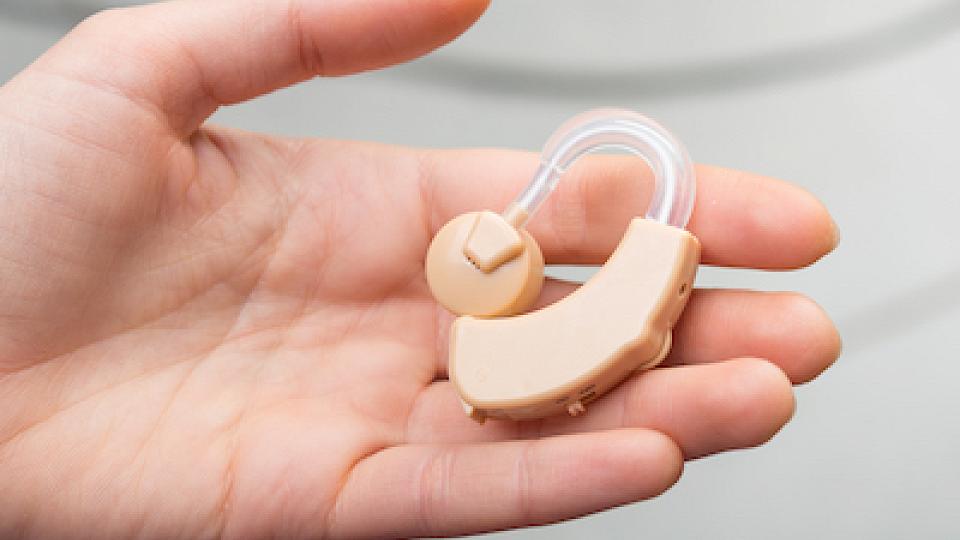
Over-the-Counter Hearing Aids Promise Better Access and Awareness, But Proceed with Caution
An estimated 37.5 million adults in the United States deal with some degree of hearing loss. But studies by the National Institutes of Health show only one-fifth of them seek the help they need to correct the problem. These numbers are particularly alarming for an aging population.
"Untreated hearing loss has a significantly higher correlation to increased dementia, cognitive decline, and depression," says Kate Johnson, AUD, CCC-A, an audiologist in the Department of Otolaryngology – Head & Neck Surgery at University of Utah Health.
Now, under a new rule, the Food and Drug Administration (FDA) allows the over-the-counter (OTC) sale of hearing aids. The most important part, according to Johnson, is that the new rule increases access and awareness about these devices. However, patients who may be experiencing hearing loss are urged to get tested by a professional to ensure the device they are purchasing is appropriate—and to determine whether there are any underlying or treatable medical conditions.
Why is the OTC Hearing Aid Act important?
The new FDA rule gives millions of Americans better access and more affordable options to OTC hearing aids. "Historically, insurance does not cover hearing aids, which are very expensive, and therefore patients are paying for them out of pocket," Johnson says. She is encouraged by the positive impact the OTC sale of hearing aids could have on Americans' health and overall quality of life.
How does the OTC hearing aids rule work?
The OTC Hearing Aid Act allows people with mild to moderate hearing loss to buy hearing aids online and in retail stores without the requirement to have a doctor's exam and a prescription for the device. This part of the rule has some medical professionals concerned and urging caution.
Hearing loss is incredibly unique to each person, which is why audiologists pushed for the FDA to guarantee the OTC devices would never be harmful to a person's hearing. "The way the FDA has worked with these OTC manufacturers is that they have made them safe," Johnson says. "These devices will never hurt someone, and you can't worsen your hearing with them. However, you could be what we describe as under- or over-amplified, which means that you don't know exactly how that device is supposed to be set."
Why are there concerns with OTC hearing aids?
"Everyone's perception of their hearing loss is a little bit different," Johnson says. "There are people who have a severe hearing loss, but if you ask them about it, they will say, ‘Oh, my hearing loss is not that bad.' Or vice versa, some say, ‘I have a horrible hearing loss,' but then as we do the testing, we find it is just a mild hearing loss."
The biggest concern is that people will start self-treating a medical issue that often requires a professional diagnosis to correct. That's why Johnson suggests that patients undergo a diagnostic hearing test with an audiologist to determine if they would be a good candidate for an OTC hearing aid. She adds that some causes of hearing loss are truly medical problems, and an OTC hearing aid will not help or correct them. Those include ear wax build up, benign auditory nerve tumors, and ear infections. Of course, if you experience a sudden hearing loss, it should be considered a medical emergency.
When to get help
You should schedule an exam with a medical professional if you have symptoms of hearing loss, which include:
- Difficulty understanding what others are saying
- Asking people to repeat themselves
- Struggling to hear in crowded places with distracting background noises
- The perception that others are mumbling or not speaking clearly
- Listening to television or radio at a higher volume than others
- Experiencing a ringing or buzzing in the ears
- Withdrawing from social situations in order to avoid conversation
"If you have hearing loss, it is recommended you get your hearing tested once a year or sooner if any changes are noted," Johnson says. "And we say that regardless of whether you are getting a hearing aid or not. We believe it is important to do those annual checks. Hearing loss can often happen very slowly and subtly over time, and you don't even notice that it is changing."


